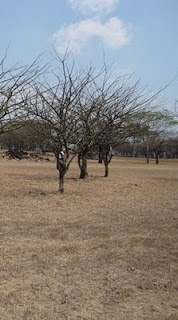The Lutheran Trifecta: The Part in the Cemetery
Día de los Difuntos - All Souls Day
is a day for family.
Día de los Difuntos literally translates as Day of the Deceased, or Day of the Dead. In El Salvador, just as in the United States, some Day of the Dead traditions from Mexico have crept into local culture - especially in the commercial realm. In El Salvador, observance of the Day of the Dead is typically a quiet event. With or without sugar skulls and mariachis, the Day of the Dead is about communing with family across across the boundaries between life on earth and life in the eternal realm.
In El Salvador, November 2nd is a public holiday. It is a time for families to visit their deceased loved ones in the places of their eternal rest. Long, long lines of cars and buses clog the streets near the large cemeteries. In small towns and in the large cities, small pop-up shops filled with flowers are set up under canopies and umbrellas. Entrepreneurs take advantage of the slow traffic to sell whatever families may need for their visits: picnic blankets, plastic flowers, cold beverages, and balloons.
 |
| Many families find comfort in just sitting for a while. |
Once at the cemetery, family members wash the tile tombs and headstones, or tidy up the earth and vegetation over the graves. Burial sites are decorated with flowers and garlands. Sometimes families bring photos of their loved ones. Deceased children are remembered with stuffed animals and balloons. Families sit, talk, remember, and just be. It's not a quick visit, it's a time for the communion of saints. Often, families take photos of these holy moments, to share with extended family and friends. Sometimes, I receive these photos. It's an honor and a blessing to receive them.
When a friend sent me some photos this year, I asked him if I could share two of them in this story. The departed ones were dear to me, and even through the photos, I could again feel their presence in my heart.
 |
| "With my little brother, Onan" (photo from Santiago) |
I remember and honor Onan. We had some wild rides in an old jeep with no innards, loose wires, and holes in the floor. His calling in life was to be a quiet helper.
 |
| "With Olimpia and Eduardo" (photo from Santiago) |
I remember and honor Olimpia. She was a devoted mother and grandmother. She was a survivor, a feminist, and badass brave. She is one of my heroes.
I remember and honor Eduardo. He was a beloved son, brother and young father. He was gifted with a musical spirit and a song in his heart. I will always remember visiting with him at the music school. His smile and joy live on in his daughter and forever in his mother's heart.
For some families, there is no grave to visit. In the heart of San Salvador, in Parque Cuscatlán, the Monument to Memory and Truth holds the names of more than 20,000 of the 75,000 civilians who were killed in El Salvador's civil war (1980-1992). On the Day of the Dead, families come to the wall to place flowers below the names of their loved ones and to pass their stories on to the younger generation.
 |
| Families remember and honor their beloveds on All Souls Day at the memorial wall |
Observing All Souls Day and remembering and honoring beloveds who have died by visiting with them in their places of rest or at a memorial is customary for most Salvadorans, whether or not they are members of a particular Christian denomination. For Salvadoran Lutherans, the traditions of All Souls Day are part of living out the belief in the communion of saints (Third Article, Apostles Creed).
For those with sistering relationships with the Salvadoran Lutheran Church, I think it is rich and beautiful for us to explore our common and our unique faith traditions and cultural practices which mark these days of Reformation, All Saints and the All Souls.
The first two reflections in this 3-part series are:
The Lutheran Trifecta: The Part with Balloons
The Lutheran Trifecta: The Part with Saints and Spooky Tales
The Lutheran Trifecta: The Part with Saints and Spooky Tales



I've been following your blog for a while now. Thank you for sharing such beautiful experiences.
ReplyDelete